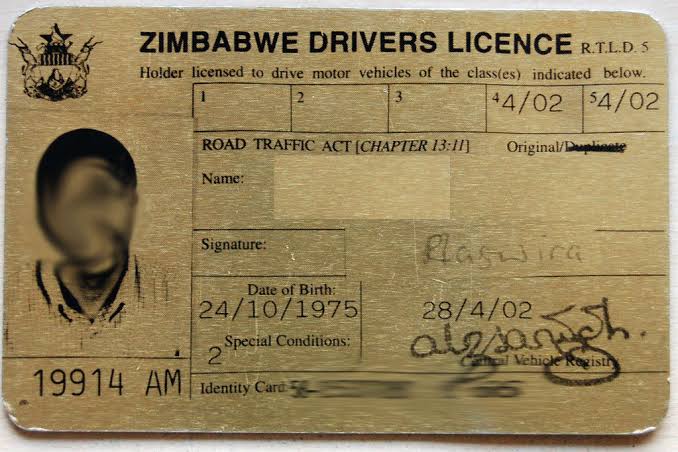Zimbabwean Drivers Using Fake Driver’s Licences In UK

Many Zimbabweans in the United Kingdom have come on either fake driver’s licences or they have paid thousands of dollars to be given licences by corrupt VID officers.
Zimbabwean drivers with fake licences are more likely to be in fatal crashes and to engage in high-risk driving behaviour like impaired driving, speeding, and driving unrestrained.
In just three months, hundreds of Zimbabweans who have just come to the UK have been involved in accidents. The most reason is that they have never driven a car before, but they hold valid driver’s licences. Some licence’s are even back-dated to appear as if the driver has experience.
“Zimbabwean drivers holding fake licences are more likely to be in fatal crashes and to engage in high-risk driving behaviours like impaired driving, speeding, and driving unrestrained. In a crash context, the influence of these high-risk behaviours may spillover to adversely affect passenger safety restraint use,” said Mr Davin Chitupa a Zimbabwean working in a traffic safety organisation in the UK.
Logistic regression with generalised estimating equations was undertaken to assess the effect of New Zimbabwean unlicensed driving on passenger restraint use. We controlled for established predictors of passenger restraint use including driver restraint use, gender, number of occupants, driver drinking, number of occupants, crash year, and crash location. This was done on all new immigrants coming wit a COS visa. Zimbabwean faulty drivers topped the list.
As we speak the DVLA is proposing a law to check on all new foreign drivers. This has become a major problem with those who come on COS having a drivers licence.
Many VID officers are cashing in on these immigrants charging the over 3 000 for getting a back-door licence.
Mr MC who gave his comment on condition of anonymity said “While passengers in fatal crashes averaged a mere 40.9% restraint use, passengers of never and invalidly licensed drivers are from Zimbabwe. Unlicensed driving is involved in a disproportionate and increasing number of preventable crash fatalities and plays a detrimental role in the lifesaving safety behaviours of their passengers. Our findings highlight an alarming pattern of new Zimbabwean unlicensed drivers and passengers, placing increased emphasis on the need to better understand and characterise this present and growing threat.”
The other problem is that most of these drivers are young. Young Zimbabwean drivers in the UK run a higher risk of road traffic crashes and road traffic injuries not only because of their lack of experience but also because of their age and confusion of the new environment.
Also, just as the injury risks to children as unprotected road users are influenced by low socioeconomic position, the same is true for the crash involvement of young drivers, most of them are given a car the day they arrive in the UK. They have to learn on the road and they will be carrying passengers.
Accidents involving a vehicle travelling on the wrong side of the road are becoming far too common and this is a particular issue in the areas with a lot of care homes or people on care shifts.
The A9 has been renowned as one of the most dangerous roads to travel on in Scotland. Since 2013, there has been an average of four deaths per year on this road with many more people seriously injured. But with the advent of COS migrants, the accident rate has risen 10-fold.
“Earlier this summer, Road Safety Scotland embarked on a campaign to remind drivers from other countries to ‘Keep Left’ after driving on the left-hand side of the road was a contributory factor in 65 road accidents in 2023 only.”
There is now a campaign looking to target foreign drivers by providing them with a wristband reminding them to drive on the left in several different languages. The campaign has the backing of Police Scotland and local car rental companies.
“At Digby Brown, we have also acted for people injured in crashes where a driver has driven on the wrong side of the road and caused an accident. But surprisingly Zimba weans drive as we do. We are still investigating why the newcomers are so nervous on the roads”
Our Inverness office recently acted for a man who was hit by a driver on the wrong side of the road when he was travelling to work along the A9. As he came over a dip in the road, he was met by another vehicle coming towards him. He tried to swerve but was unable to avoid a head-on collision.
As a result of the accident, he was unable to work for two weeks and needed help from his family with everyday tasks. Whilst his employers did pay him for the time he needed off work, he lost out on his shift allowance, which made up 10 percent of his monthly salary.
The driver was a Zimbabwean who had spent just three days in the UK.
We raised the case and were able to persuade the insurers that liability was very clear in this case and they confirmed that their driver was liable for the accident, and they were therefore required to pay compensation to our client.
The case highlights both the dangers of corruption in our VID officers. Their corruption has its ripple effects miles away from home.
The dangers of inexperience as a factor in the cause of accidents is frightening in the UK. It’s sad our own people are causing this.
Many drivers travelling that far north are not familiar with the roads and a simple lapse of concentration can have very real consequences now on top of that you add no experience in driving.
If you are new to the United Kingdom your entitlement to drive in the United Kingdom will depend on a couple of factors. These factors include your residency status and the country that you and you’re your existing driver’s licence come from. Providing that you have a full driver’s licence from the European Economic Area (EEA), or one of the many designated countries that Britain has reciprocal agreements with somewhere in the world, you will be able to drive in the United Kingdom for at least up to twelve months as long as you have no intention of staying for longer than 12 months.
For all foreign drivers not taking up residency in the United Kingdom, you are able to use your existing driving licence for up to 12 months while in the United Kingdom. This stipulation is extended to all countries that are a part of the EU, EEA, Britain’s Designated Countries, and any other country. Zimbabwe is a Britaim Designated Country.
Do note: in the case of some countries such as Canada, you will be permitted to drive an automatic vehicle barring proof that you have passed a test in your home country ensuring you can operate a manual vehicle on the road.
To be classified as a resident of the United Kingdom you must fall under these criteria:
1. You spent 183 or more days in the UK in the tax year; and
2. Your only home was in the UK- you must have owned, rented, or lived in it for at least 91 days in total- and you spent at least 30 days there in the tax year.
If you classify as a resident of the United Kingdom, then after a certain designation of time, depending on where your original licence is from, you must apply to exchange it for a British licence.
With the way things are happening, it won’t be long before Zimbabwean Licence is banned in the UK.
Herald








